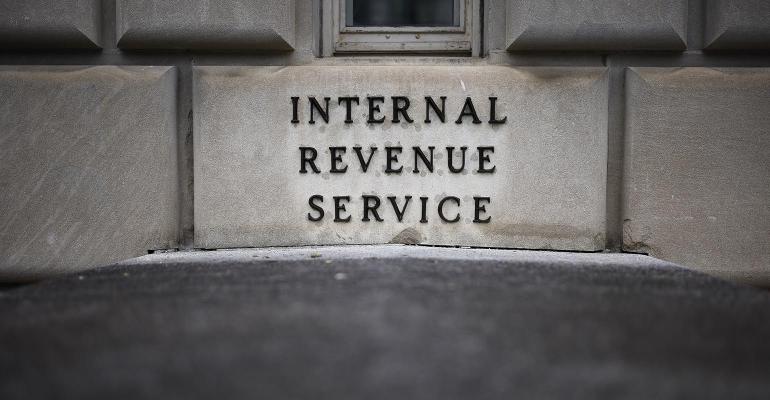The Internal Revenue Service announced earlier this month that it’s substantially beefed up its high wealth group with a particular focus on partnerships, complex corporate structures, pass-through entities and digital assets. While tax fraud and non-compliance occurs at all socio-economic levels, the biggest prizes are usually found at the top of the food chain – that is, your clients. As legendary bank robber Willie Sutton would say: “Because that’s where the money is.”
In fact, the IRS set up an entire division just to scrutinize partnerships and limited liability companies (LLCs). Things will get tougher for the one (and two) percenters, as the Treasury needs to expand its coffers with a record budget deficit and a potential recession looming on the horizon.
There's an entire section of the Internal Revenue Manual now dedicated to its Global High-Wealth Group. The IRS will identify a “key case” and include “related income tax returns where the individual has a controlling interest and significant compliance risk is deemed to exist.” The related cases, called “enterprise” cases, may include “interests in partnerships, trusts, subchapter S corporations, C corporations, gift tax or estate returns.” To support those bold enforcement plans, the IRC announced plans to triple the size of its Global High-Wealth Group, from two to six offices, as it claims more than 50% of the high-wealth audits involve passthrough partnerships.
With the $80 billion funding windfall provided by the Inflation Reduction Act, the IRS may feel the pressure to produce increased collection revenue to justify it. So, it’s s committed to hiring 20,000 new staff over two years and 3,700 new agents. On top of added manpower, the agency is investing an estimated $12 billion to upgrade its technology. The IRS is hiring many of the same code writers who create algorithms for Facebook and Twitter/X to compare various entities against other records to see if all of their income is being reported and that all their expenses are legit. Bottom line: the IRS isn’t playing around. Neither should your clients.
By investing in AI and new analytics solutions, IRS Commissioner Danny Werfel said publicly that the agency can use technology to detect patterns, trends and activities that they can link to tax evasion, freeing up employees to focus on other matters.
While it’s hard to defend the IRS sometimes, I’ve seen way too many advisors playing fast and loose with the rules. They want to cut corners and overlook ethics and good tax practices just so they don’t lose a large asset under management client. If you’re dealing in the HNW marketplace, that’s not going to fly anymore. Nor should it. Make sure you know your stuff, or that someone on your team knows their stuff because the risk of non-compliance is rising substantially.
Going back over the years, most of the bad Tax Court cases I’ve seen are from people who misused LLCs, such as transferring LLCs interests to kids. Often, they’re still trying to use those interests as if it’s their personal checkbook to pay for everything from household bills to luxury items. Or they take money in and out of trusts that shouldn’t have been touched. It’s going to be harder to get away with things like that. HNW taxpayers and their expensive advisors won’t find it as easy to hide behind complexity alone.
Pass-Through Entities Under Scrutiny
This fall, the IRS established a new work unit in the Large Business & International (LB&I) division to concentrate on large or complex pass-through entities, and it ramped up hiring of agents and staff reviewing partnerships. The IRS has long known that certain high-net-worth (HNW) taxpayers are using complex pass-through structures to avoid paying income tax, but until recently, it didn’t have the resources to pursue many cases. Now, the Global High-Wealth Group will be closely aligned with this new unit. Pass-through entities include partnerships, LLCs and S corps. The IRS believes consolidating expertise in the new working unit will allow it to understand complex pass-through structures -- and more readily identify abuses.
The IRS is setting its sights on other large partnerships as it opens examinations of 75 of the largest partnerships in the United States, each with assets of more than $10 billion. But the net is being cast wider on discrepancies on balance sheets involving partnerships with over $10 million (not billion) in assets. The IRS said those discrepancies can be an indicator of potential non-compliance. In these cases, the IRS reports that taxpayers filing partnership returns are showing discrepancies in the millions of dollars between end-of-year balances compared to the beginning balances the following year, those numbers have been increasing over the years without explanation.
Foreign Bank Account Reporting (FBAR)
The IRS also promised greater scrutiny of HNW taxpayers who have foreign bank accounts. As part of the Bank Secrecy Act, every U.S. person with a financial interest in, or signature or other authority over, one or more foreign financial accounts (bank accounts, brokerage accounts and mutual funds) with an aggregate value of more than $10,000 must report the account to the Treasury Department each year via FinCEN Form 114. You’ll often hear these reports referred to as “FBARs.” The penalties for failing to file an FBAR can be severe. For willful violations, the penalty can be as high as the greater of $100,000 or 50% of the account balance. Non-willful violations carry a penalty of up to $10,000 per violation. In some cases, criminal charges can also be filed. Ouch!
Cryptocurrencies
It should come as no surprise that the IRS has set its sights on crypto and other digital assets, too, as it estimates a 75% non-compliance rate among taxpayers. This estimate was calculated through records obtained from digital exchanges. The IRS warned more digital asset cases will be tagged for compliance review next year.=
Randy A. Fox, CFP, AEP is the founder of Two Hawks Consulting LLC. He is a nationally known wealth strategist, philanthropic estate planner, educator and speaker.

